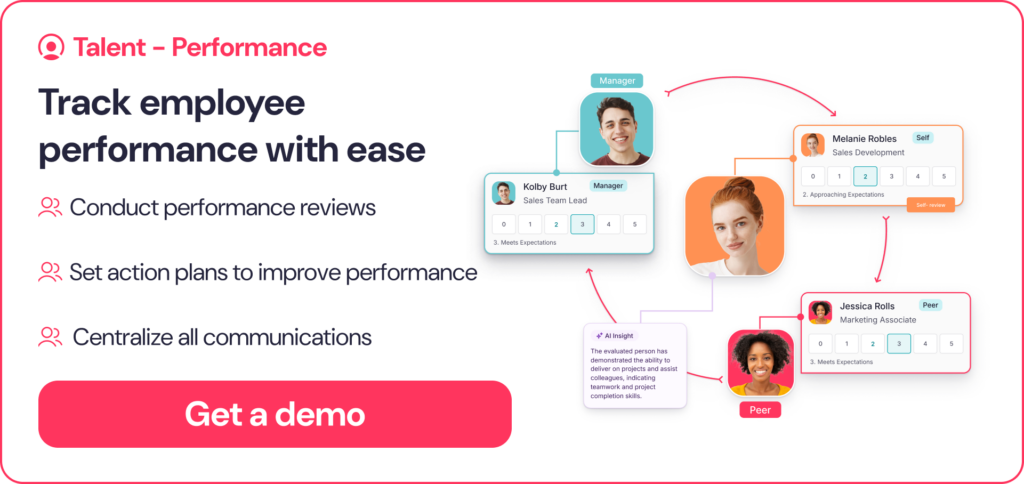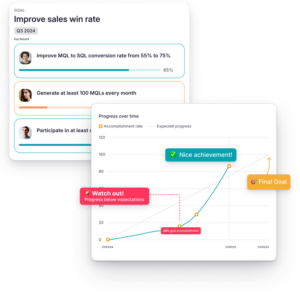Conducting appraisals for your employees may sound easy on paper, but it’s not unusual that difficulties arise once you start the process. After all, an appraisal usually involves giving people feedback, and that’s not always an easy thing to do. Even top-performing employees can struggle to hear how they can improve. However, conducting a well-run appraisal can result in a meaningful discussion between the employer and employee, significantly improving productivity and engagement.
Being prepared is essential to make the most of the appraisal process. In this article, we run through what’s involved in a performance appraisal, talk about some of the challenges that can arise and how best to prepare and finish with eight tips to help you learn how to do an appraisal.
What Is A Performance Appraisal?
A performance appraisal is the name given to the process when an employee’s performance in their role is assessed. You may also hear it referred to as a performance review, performance assessment or employee evaluation.
An appraisal usually has the following parameters:
- It is time-bound, ie, over a specific period.
- It includes what an individual has achieved and any issues arising during the particular period.
- It assesses the individual’s strengths and potential areas for improvement.
- It outlines the employee’s overall contribution to the company.
- It usually involves discussing the individual’s career goals and plans.
As well as driving company performance, appraisals have many benefits, including motivating employees, identifying training needs and development opportunities, and contributing to operational plans.
How To Prepare for A Performance Appraisal
Preparation is essential if you want to conduct performance appraisals that result in changes to productivity, engagement and growth. But understanding you need to prepare is one thing, knowing what that preparation should entail is not always obvious. Here are six steps to help employers prepare for an appraisal meeting.
- Clarify Your Expectations
Before any appraisal process starts, all parties must understand what is expected from the individual employee in terms of responsibilities and goals. Managers must clearly outline responsibilities in the job description and share and agree on goals with employees at the beginning of the year.
- Outline The Process
Ensure that the employee is clear on what will happen as part of the appraisal process, including deadlines for their contributions (such as self-assessment evaluations), who will be consulted for feedback and when meetings will be held. Clearly explain to the employee how the appraisal links to compensation or benefits. Sharing an agenda for each meeting can be a valuable approach to help both parties get into the right mindset for a productive conversation.
- Gather Evidence
Performance appraisals should be built on factual details about how the employee has performed. During each appraisal period, keep notes of achievements or problems each individual needs to solve. Collect any relevant reports they have written or contributed to and ask team members they have worked with to supply their feedback. 360-degree feedback is a good place to start this process.
- Make Your Notes
Spend some time thinking about the areas of success you want to highlight and celebrate and consider how best to tackle the constructive side of the conversation. If you work closely with your employee well, you will know if they prefer direct talking or need a more tactful approach. If you don’t know them so well, it can be helpful to create some open questions which can help them and you start thinking about the challenges you need to discuss.
- Prepare The Environment
To facilitate an open, honest and constructive discussion, it is essential to think about the space you are meeting in. It should be soundproof and private, with an appropriate temperature and lighting to make the employee feel comfortable and relaxed. You will also need to have a method for note-taking so you can follow up after the discussion.
- Mentally Prepare
Having the right mindset to lead an appraisal meeting takes some mental preparation. Preparing what you want to say provides a strong foundation. Taking a moment to ground yourself and start the meeting calmly also helps set a positive tone. The person running the meeting needs to be ready to give and receive feedback and to have an open-minded discussion about what you have both learnt from the achievements and challenges of the period.
Challenges When Conducting Appraisals
Conducting the appraisal process can be challenging, especially when sharing constructive feedback. Managers often face the following common challenges during the process:
Employee Defensiveness
Many people struggle to hear that they haven’t performed to their potential or that their behavior has prompted critical feedback. Defensive responses are common in the appraisal process and can make it challenging to move the discussion forward. Sometimes, taking a break or allowing the employee time to collect their thoughts is necessary. Putting yourself in your employee’s shoes and thinking about how you might feel if confronted with feedback can help you respond calmly to whatever they say.
Legal Issues
Poor Preparation
Earlier, we discussed the different ways to prepare for a performance appraisal. When managers skip these steps, the appraisal meeting often lacks the information, expectations, and supportive atmosphere needed for success. Without this foundation, it’s difficult to create the conditions for a meaningful and productive discussion. An appraisal that lacks thorough preparation can lead to disengaged employees and damage overall productivity.
Failure to Follow Up
A significant challenge to the appraisal process occurs when there are constructive and productive conversations in the meeting but the employer does not follow up as promised. Change stalls when leaders fail to support or track action points. Without follow-ups, employees quickly feel undervalued, as this sends a clear message that the process is merely a formality and lacks genuine engagement beyond the meeting.
Top 8 Appraisal Tips
If you are about to start the performance appraisal process with your employees, remember these simple top tips:
- Outline the process, set an agenda and make your own notes before the meeting.
- Use different sources to gather the evidence you use to evaluate the employee’s performance.
- Create a comfortable environment for the performance appraisal discussion.
- Invite self-reflection to ensure employees feel ownership of their part in the process. Aim for the employee to talk 50% of the time, to make it a shared collaborative experience.
- Be clear and specific in the examples you use.
- Celebrate achievements and strengths.
- Frame difficult discussions about behaviour or performance as an opportunity for growth rather than a criticism.
- Follow up with scheduled check-ins, getting any information you promised to supply and supporting training as required.
Conduct Appraisals with Factorial
Using Factorial’s business management system can streamline your company’s performance appraisal process. Utilising a tool like Factorial makes conducting an appraisal simpler, faster, and more tailored to each individual employee. The software automates routine tasks, offers customizable templates, tracks goals and KPIs, and provides valuable data insights. It also supports learning and development programs.
By removing much of the administrative burden, Factorial’s Performance Management Software allows leaders and HR managers to focus on what truly matters in the appraisal cycle: having meaningful conversations that boost engagement and drive productivity.



